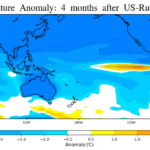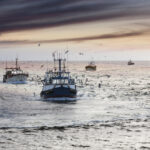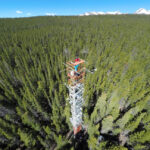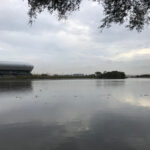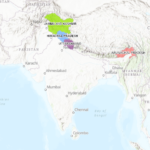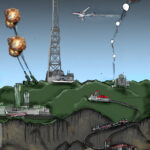By Mary Whelan, assistant professor in the Department of Environmental Sciences. Organizing a creative remote meeting is a delicate maneuver. The resources available to us are limited, with attention being the scarcest commodity. Honestly, I cannot pay attention for a full hour, even when I am invested in the subject matter. Those of us who […]
Environmental Sciences
Nuclear War Could Trigger Big El Niño and Decrease Seafood
Unprecedented warming in equatorial Pacific Ocean could last up to seven years A nuclear war could trigger an unprecedented El Niño-like warming episode in the equatorial Pacific Ocean, slashing algal populations by 40 percent and likely lowering the fish catch, according to a Rutgers-led study. The research, published in the journal Communications Earth & Environment, shows […]
Homegrown Faculty Reflect on Their Roots
Whether they returned to the school or never left, these faculty members are among a number who are also alumni. Reprinted from Explorations, Fall 2019 SEBS faculty hold degrees from universities across the nation and around the globe, but there are also a number of homegrown faculty who received their degrees when the school was […]
Department of Environmental Sciences Wins Governor’s Environmental Excellence Award
Rutgers Department of Environmental Sciences (DES) was named winner of the 2020 Governor’s Environmental Excellence Award, in the Environmental Education (Educator Led) category, at a virtual ceremony held on Dec 14. This award category recognizes “an educator, student, group of students, or class that has planned and implemented a project or program with measurable, positive […]
Marine Fisheries Will Not Offset Farm Losses after Nuclear War
Effective pre-war fisheries management could help in global food emergency After a nuclear war, wild-catch marine fisheries will not offset the loss of food grown on land, especially if widespread overfishing continues, according to a Rutgers co-authored study. But effective pre-war fisheries management would greatly boost the oceans’ potential contribution of protein and nutrients during […]
How to Get a Handle on Carbon Dioxide Uptake by Plants
How much carbon dioxide, a pivotal greenhouse gas behind global warming, is absorbed by plants on land? It’s a deceptively complicated question, so a Rutgers-led group of scientists recommends combining two cutting-edge tools to help answer the crucial climate change-related question. “We need to understand how the Earth is breathing now to know how resilient […]
Four SEBS Faculty Honored at Chancellor’s Celebration of Faculty Excellence
On September 24, the Rutgers-New Brunswick Chancellor’s Celebration of Faculty Excellence was conducted virtually to honor faculty members at all stages of their careers whose outstanding work has been recognized by their peers. Among the honorees across the News Brunswick campus were four faculty members of the School of Environmental and Biological Sciences, whose interim […]
Bacteria Can Defuse Dangerous Chemical In Passaic River
Rutgers study suggests pollutant’s toxicity could be decreased Bacteria that can help defuse highly toxic dioxin in sediments in the Passaic River – a Superfund hazardous waste site – could eventually aid cleanup efforts at other dioxin-contaminated sites around the world, according to Rutgers scientists. Their research, published in the journal Environmental Science & Technology, needs further […]
Geoengineering’s Benefits Limited for Apple Crops in India
Abruptly ending climate intervention might backfire rapidly Geoengineering – spraying sulfur dioxide into the atmosphere to combat global warming – would only temporarily and partially benefit apple production in northern India, according to a Rutgers co-authored study. But abruptly ending geoengineering might lead to total crop failure faster than if geoengineering were not done, according to […]
Geoengineering is Just a Partial Solution to Fight Climate Change
The technology’s regional impacts depend on how much greenhouse gas emissions are reduced Could we create massive sulfuric acid clouds that limit global warming and help meet the 2015 Paris international climate goals, while reducing unintended impacts? Yes, in theory, according to a Rutgers co-authored study in the journal Earth System Dynamics. Spraying sulfur dioxide into the […]


